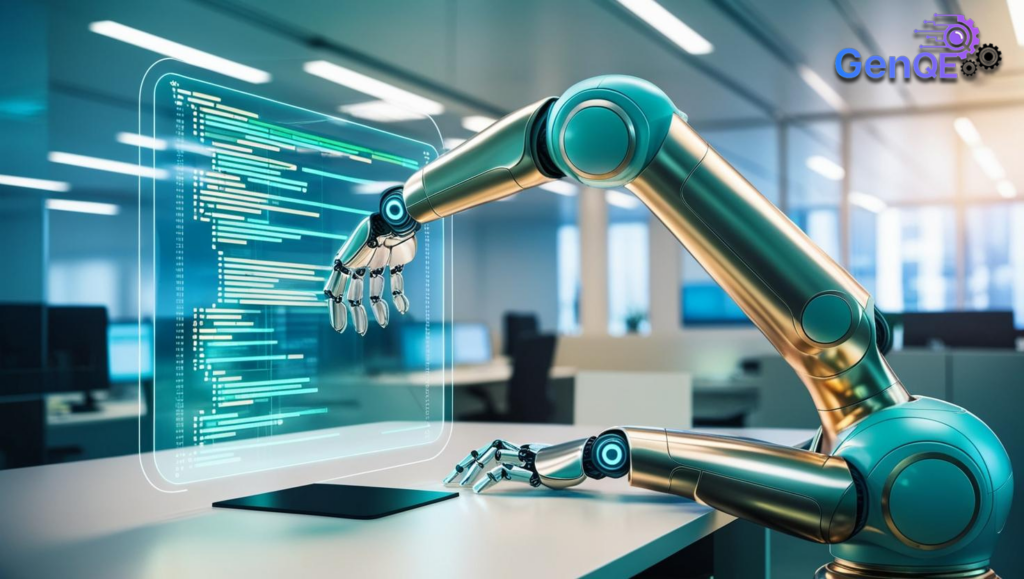
Introduction
The software industry is evolving at an unprecedented pace, driven by innovations in artificial intelligence (AI), automation, and cloud computing. One of the most significant transformations in recent years is the integration of AI into software testing and quality assurance (QA). Traditional testing methods, though effective, are often time-consuming and require extensive manual effort. AI-powered testing solutions are changing the game by enhancing test automation, optimizing defect detection, and reducing the time required for quality assurance processes.
AI in quality assurance is not just about automating test scripts but also about making testing smarter and more predictive. Machine learning algorithms can analyze past test results, predict defects before they happen, and self-heal broken test scripts, making QA processes more efficient and resilient. As organizations strive for faster releases and higher-quality software, AI-driven testing is becoming a necessity rather than an option.
This article delves into how AI is transforming software testing, the benefits and challenges of AI-driven QA, the role of AI-powered test automation, and future trends in AI-enhanced software testing.
How AI is Transforming Software Testing
Artificial intelligence has introduced a new level of intelligence in software testing by allowing machines to learn from data, adapt to changes, and improve over time. Unlike traditional testing, which relies on predefined test cases, AI-powered testing solutions can analyze application behavior, generate test scenarios dynamically, and identify defects more accurately.
1. AI-Powered Test Automation
AI enhances traditional test automation by introducing capabilities such as self-healing scripts, automated test case generation, and intelligent test execution planning. Self-healing scripts allow automated tests to adapt to UI or code changes without requiring manual updates, reducing test maintenance efforts significantly. Tools like Testim, Applitools, and Functionize leverage AI to enhance automated testing frameworks, making them more robust and resilient.
2. Predictive Analytics in Testing
AI-driven analytics help QA teams predict potential failure points before they occur. By analyzing historical test data, machine learning algorithms can identify trends and patterns in software defects. This enables teams to focus on high-risk areas, improving overall software quality and reducing post-release issues.
3. Intelligent Defect Detection
AI can analyze logs, test execution results, and application behavior to detect anomalies and defects that might go unnoticed in traditional testing. AI-based visual testing tools can also perform UI comparisons and detect differences at a pixel level, ensuring that visual elements remain consistent across multiple platforms.
4. AI in Performance Testing
AI can optimize performance testing by simulating real-world user behavior and predicting system performance under different loads. AI-powered tools analyze previous performance test results to fine-tune testing scenarios, enabling more accurate and efficient stress testing.
Benefits of AI-Driven Quality Assurance
The adoption of AI in software testing comes with numerous benefits, including:
- Faster Test Execution: AI enables automated test case generation and execution, significantly reducing test cycles.
- Improved Accuracy: AI-driven testing minimizes human errors and ensures more precise defect detection.
- Cost Savings: AI reduces manual effort, test maintenance costs, and infrastructure expenses.
- Enhanced Coverage: AI can test varied and complex user scenarios that would be difficult to achieve manually.
- Continuous Learning: AI models continuously learn from new data, improving test efficiency over time.
Challenges in Implementing AI for Testing
Despite its advantages, integrating AI into software testing presents several challenges:
- High Initial Investment: AI-driven tools can be expensive, and organizations may need to train AI models with large datasets.
- Skill Gap: Testers need to acquire new skills in AI, ML, and data analytics to work effectively with AI-driven tools.
- Data Privacy Concerns: AI relies on large datasets, raising concerns about data security and privacy.
- Complexity in Debugging AI Models: Unlike traditional test scripts, AI models can be difficult to debug, requiring advanced expertise.
Future Trends in AI-Powered Software Testing
1. Autonomous Testing
AI is paving the way for fully autonomous testing, where machines can design, execute, and evaluate test cases without human intervention. This could dramatically reduce testing timelines and increase efficiency.
2. AI-Driven Test Optimization
As AI systems become more sophisticated, they will be able to optimize testing by prioritizing critical test cases based on application risk assessment.
3. AI in Security Testing
Cybersecurity threats are evolving, and AI is being used to detect vulnerabilities in applications and networks before they can be exploited. AI-powered tools can analyze security logs, detect anomalies, and prevent security breaches.
4. AI for Continuous Testing in DevOps
AI-driven testing will become a core part of CI/CD pipelines, enabling real-time defect detection and self-adjusting test strategies that align with rapid deployment cycles.
5. Natural Language Processing (NLP) in Test Automation
NLP-powered testing tools will allow testers to write test cases in natural language, making test automation more accessible to non-technical stakeholders.
Conclusion
AI is fundamentally reshaping software testing and quality assurance, making it more intelligent, efficient, and predictive. While challenges exist, the benefits of AI-driven testing far outweigh the obstacles, leading to faster release cycles, enhanced software quality, and reduced testing costs.
As AI continues to evolve, software testers must adapt by developing new skills in AI and machine learning. The future of software testing lies in the seamless integration of AI-driven testing solutions within DevOps, Agile, and cloud environments, ensuring that software remains secure, high-performing, and reliable in an increasingly competitive digital landscape.